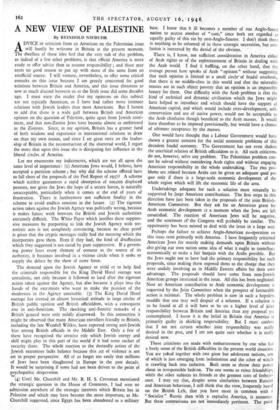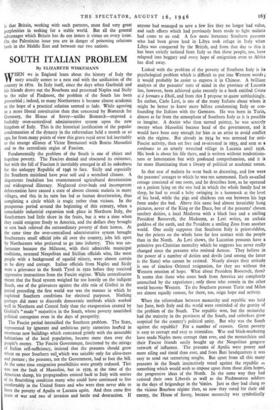A NEW VIEW OF PALESTINE
By REINHOLD NIEBUHR
ADVICE or criticism from an American on the Palestinian issue will hardly be welcome in Britain at the present moment. The dwellers of these isles feel that the very rub of this problem, as indeed of a few other pmblems, is that official America is more ready to offer advice than to assume responsibility ; and there may seem no good reason to put up with more of the same from an unofficial source. I will venture, nevertheless, to offer some critical remarks on this issue because I am greatly concerned for good relations betwecn Britain and America, and this issue threatens to sow as much discord between us as the Irish issue did some decades ago. I must warn the reader that my opinions on this subject are not typically American, as I have had rather more intimate relations with Jewish leaders than most Americans. But I hasten to . add that there is a wide gulf between British and American opinion on the question of Palestine, quite apart from Jewish senti- ment, and that non-Zionist Jews have become almost as embittered as the Zionists. Since, in my opinion, Britain has a greater fund of both wisdom and experience in international. relations to draw on than my own nation, and since I set great store on the leader- ship of Britain in the reconstruction of the shattered world, I regret the more that upon this issue she is dissipating her influence in the liberal circles of America.
Let me enumerate my indictments, which are not all upon the same level of importance: (t) American Jews would, I believe, have accepted a partition scheme ; but why did the scheme offered have to fall short of the proposals of the Peel Report of 1937? A scheme which neither guarantees a rapid absorption of too,000 displaced persons, nor gives the Jews the hope of a secure haven, is naturally unacceptable, particularly when it comes at- the end of years of frustration. There is furthermore not sufficient finality in the scheme to avoid endless tensions in the future. (2) The rigorous action taken against the Jewish Agency was politically wrong, because it makes future work between the British and Jewish authorities extremely difficult. The White Paper which justifies these suppres- sive measures by purporting to link the Jewish Agency with ter- roristic acts is not completely convincing, because no clear proof is given that the cryptic messages really had the meaning which the interpretors gave them. Even if they had, the kind of disaffection which they suggested is not cured by pure suppression. If a govern- ing power loses every element of consent as the source of its authority, it becomes involved in a vicious circle when it seeks to -supply the defect by the show of more force.
The demand upon the Jewish Agency to yield or to help find the criminals responsible for the King David Hotel outrage was unrealistic, not only because it followed so hard after the- rigorous action taken against the Agency, but also because it plays into the hands of the extremists who want to make the position of the Moderates in the Agency untenable. (3) The King David Hotel outrage has created an almost hysterical attitude in large circles of British public opinion and British officialdom, with a consequent rise in anti-Semitism. The shocking anti-Semitic remarks of a British'general were only mildly disavowed. In this connection it might be observed that many American travellers friendly to Britain, including the late Wendell Wilikie, have reported strong anti-Jewish bias among British officials in the Middle East. Only a few of these have recognised the creative role which Jewish energy and skill might play in this part of the world if it had some anchor of security there. The whole reaction to the dastardly action of the Jewish extremists lacks balance because this act of violence is not set in proper perspective. All of us forget too easily that millions of Jews have been slaughtered in .Europe in the past decade. It would be surprising if some had not been driven to the point of psychopathic desperation.
(4) Until Mt. Churchill and Mr. R. H. S. Crossman mentioned the strategic question in the House of Commons, I had seen no admission anywhere of the strategic interests which Britain has in Palestine and which may have become the more important; as Mr. Churchill suggested, since Egypt has been abandoned as a military base. I know that it ill becomes a member of one Anglo-Saxon nation to accuse another of "cant," since both are regarded as equally guilty of this sin by non-Anglo-Saxons. I don't think there is anything to be ashamed of in these strategic necessities, but con- fusion is increased by the denial of the obvious. - There is, I know, not sufficient consideration in America either of Arab rights or of the embarrassment of Britain in dealing with the Arab world. I find it baffling, on the other hand, that the average person here speaks of Arab " opinion " without suggesting that such opinion is limited to a small circle of feudal overlords, that there is no middle-class in this world and that the miserable masses are in such abject poverty that an opinion is an impossible luxury for them. One difficulty with the Arab problem is that the kind of technical and dynamic civilisation which the Jews might have helped to introduce and which should have the support of American capital, and which would include river-development, soil- conservation and use of native power, would not be acceptable to the Arab chieftains though beneficial to the Arab masses. It would have therefore to be imposed provisionally, but would have a chance of ultimate acceptance by the masses.
One would have thought that a Labour Government would have shown a greater concern for the social economic problems of this
decadent feudal economy. The Government has not even shaken the uncritical relation of British officialdom to it. All such criticisms do not, however, solve any problem. The Palestinian problem can- not be solved without considering Arab rights and without engaging American responsibility in the whole undertaking. The two pro- blems are related because Arabs can be given an adequate quid pro quo only if there is a large-scale economic development of the whole region which will lift the economic life of the area.
Undertakings adequate for such a solution must naturally be supported by jarge American contributions. The first steps in this direction have just been taken in the proposals of the joint British- American Committee. But they ask for an American grant for Arab economic development a a moment when the Jews are left unsatisfied. The reaction of American Jews will be negative, and the sentiment of* the Congress will probably be similar. The opportunity has been missed to deal with the issue in a large way. Perhaps the failure to achieve Anglo-American co-operation on this issue rests primarily with America. I have frequently criticised
American Jews for merely making demands upon Britain without also giving our own nation some idea of what it ought to contribute economically to make a fair bargain with the Arabs possible. But the Jews ought not to have had the primary responsibility for such proposals, since making them exposed them to the charge that they were unduly involving us in Middle Eastern affairs for their own advantage. The proposals should have come from non-Jewish American groups interested in the issue. All this has been neglected. Now an American contribution to Arab economic development is requested by the Joint Committee when the prospect of favourable action is minimal. The whole problem is now in such a hopeless muddle that one may well despair of a solution. If a solution is to be found at all it will have to be on a higher level of joint responsibility between Britain and America than any proposal yez contemplated. I.know it is the belief in Britain that America is primarily guilty in shirking responsibility. But I must confess that I am not certain whether joint responsibility was really desired in the past, and I am not quite sure whether it is really desired now.
These criticisms are made with embarrassment by one who has a lively sense of the British difficulties in the present world situation.. You are yoked together with two giant but adolescent nations, one of which is just emerging from isolationism and the other of which is crawling back into isolation. Both seem to throw their power about in irresponsible fashion. The one seems to reject friendship, while the other subjects its friends to the greatest tests of forbear- ance. I may say that, despite some similarities between Russian and American behaviour, I still think that the view, frequently heard on the British Left, that you have more in common with a " Socialist " Russia than with a capitalist America, is nonsense. But these comparisons are not immediately pertinent. The point
is that Britain, working with such partners, must find very great perplexities in seeking for a stable world. But all the general advantages which Britain has do not insure it virtue on every issue. On the Palestinian issue you are in danger of poisoning relations both in the Middle East and between our two nations.



























 Previous page
Previous page